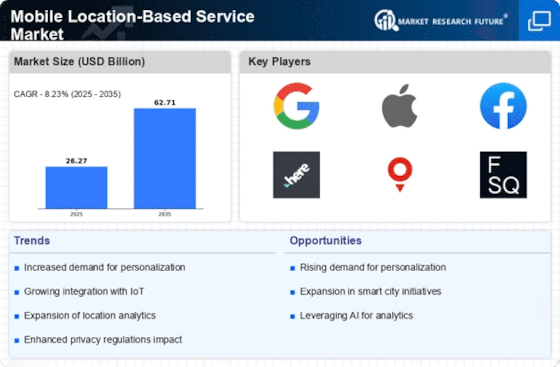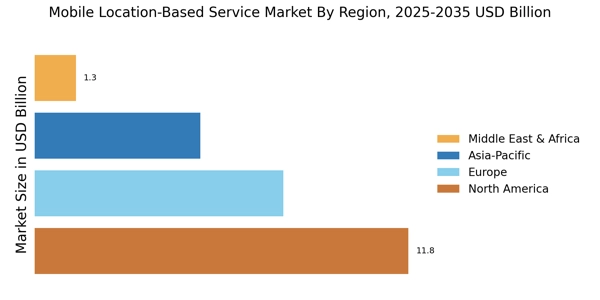Integration of IoT Devices
The integration of Internet of Things (IoT) devices is transforming the Mobile Location-Based Service Market. As more devices become interconnected, the ability to gather and analyze location data in real-time is significantly enhanced. This interconnectedness allows businesses to offer innovative services, such as smart city applications and location-aware marketing strategies. For example, the deployment of IoT sensors in urban areas can provide valuable insights into traffic patterns and consumer behavior. This data can be leveraged to improve service delivery and urban planning. The ongoing expansion of IoT technology is likely to drive further growth in the Mobile Location-Based Service Market, as companies seek to capitalize on the benefits of real-time location data.
Rising Demand for Personalized Services
The Mobile Location-Based Service Market is experiencing a notable surge in demand for personalized services. Consumers increasingly expect tailored experiences based on their location, which drives businesses to adopt location-based technologies. According to recent data, approximately 70% of consumers are more likely to engage with personalized content. This trend compels companies to leverage location data to enhance customer engagement and satisfaction. As a result, businesses are investing in mobile applications that utilize geolocation features to provide customized offers and recommendations. This shift not only improves customer loyalty but also boosts sales, indicating a robust growth trajectory for the Mobile Location-Based Service Market.
Growth of E-commerce and On-Demand Services
The proliferation of e-commerce and on-demand services is a key driver for the Mobile Location-Based Service Market. As consumers increasingly turn to online shopping and delivery services, businesses are utilizing location-based services to optimize logistics and enhance user experience. Data indicates that over 60% of consumers prefer services that provide real-time tracking of their orders. This preference encourages companies to integrate location-based functionalities into their platforms, facilitating efficient delivery and improved customer satisfaction. Consequently, the Mobile Location-Based Service Market is poised for substantial growth as businesses adapt to the evolving demands of consumers in the digital marketplace.
Increased Focus on Location-Based Analytics
The growing emphasis on location-based analytics is a pivotal driver for the Mobile Location-Based Service Market. Businesses are increasingly recognizing the value of location data in informing strategic decisions and enhancing operational efficiency. By analyzing location-based insights, companies can identify trends, optimize marketing strategies, and improve customer targeting. Recent studies suggest that organizations utilizing location analytics experience a 20% increase in marketing effectiveness. This trend underscores the importance of location data in driving business success, prompting more companies to invest in location-based analytics tools. As this focus intensifies, the Mobile Location-Based Service Market is expected to witness accelerated growth, fueled by the demand for data-driven decision-making.
Advancements in GPS and Mapping Technologies
Technological advancements in GPS and mapping technologies are significantly influencing the Mobile Location-Based Service Market. Enhanced accuracy and real-time data capabilities are enabling businesses to offer more reliable location-based services. For instance, the integration of high-definition mapping and improved satellite systems has led to a 30% increase in the precision of location tracking. This improvement allows companies to provide better navigation services, location-based advertising, and fleet management solutions. As these technologies continue to evolve, they are expected to further propel the growth of the Mobile Location-Based Service Market, creating new opportunities for innovation and service delivery.

















